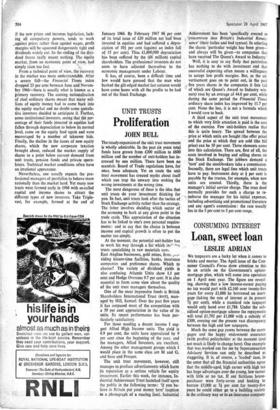Proliferation
UNIT TRUSTS JOHN BULL
The steady expansion of the unit trust movement is wholly admirable. In the past six years total funds have grown from £200 million to £600 million and the number of unit-holders has in- creased by one million. There have been no scandals. Board of Trade regulations have, for once, been adequate. Yet en route the unit trust movement has created myths about itself which can trap the unwary into making the wrong investments at the wrong time.
The most dangerous of these is the idea that unit trusts do your investment thinking for you. In fact, unit trusts look after the tactics of Stock Exchange activity rather than the strategy. The latter involves deciding which sector of the economy to back at any given point in the trade cycle. This appreciation of the situation has to be linked to one's own personal require- ments: and to say that the choice is between income and capital growth is often to put the matter too simply.
At the moment, the potential unit-holder has to work his way through a list which inc'..4-s trusts specialising in raw materials corn, East Anglian businesses, gold mines, firms k,
viding leisure-time facilities, banks, insurance companies and preference shares. Which to choose? The variety of dividend yields is also confusing. Atlantic Units show 1.1 per cent and Hodge Overseas 9.7 per cent. It is also essential to form some view about the quality of the unit trust managers themselves.
One of the most impressive funds is British Shareholders International Trust (Bsu), man- aged by Hill, Samuel. Over the past five years it has outpaced most of the competition With a 50 per cent appreciation in the value of its units. Its recent performance has been par- ticularly satisfactory.
For those needing a decent income I sug- gest Allied High Income units. The yield is 6.9 per cent, the units have appreciated by 9 per cent since the beginning of the year, and the managers, Allied Investors, are excellent. Among the other management groups which I would place in the same class are M and G, and Save and Prosper.
The unit trust movement, however, still manages to produce advertisements which harm its reputation as a serious vehicle for equity investment. Earlier this week, for instance, In- dustrial Achievement Trust launched itself upon the public in the following terms: 'if you be- lieve in Britain put your money here' (caption to a- photograph of a roaring lion).. Industrial
Achievement has been 'specifically created to concentrate into Britain's Industrial Renais- sance' (their italics and bad syntax). In selecting the shares 'particular weight has been given— and always will be given—to companies that have received The Queen's Award to Industry.'
Well, it is easy to say flatly that patriotism has nothing to do with investment and that successful exporting often means a willingness to accept low profit margins. But, as the ad- vertisement goes on to point out, in the past five years shares in the companies it lists (all of which are Queen's Award to Industry win- ners) rose by an average of 44.6 per cent, while during the same period the Financial Times ordinary share index has improved by 11.7 per cent. None the less, it is not a formula which I would care to back.
A third aspect of the unit trust movement to which very little attention is paid is the cost of the exercise. Few unit-holders realise that this is quite heavy. The spread between the price at which units are bought (the offer price) and the price at which they are sold (the bid price) can be 10 per cent. Three elements come into this calculation. There are, first of all, the costs involved in buying and selling shares on the Stock Exchange. The jobbers demand a 'turn' and the stockbrokers take a commission. Secondly, there are legal fees which unit trusts have to pay. Instrument duty at I per cent is payable by the trustee, for example, when new units are created. Thirdly, there is the manager's initial service charge. The trust deed normally provides for such a charge to re- imburse the manager for his initial expenses, including advertising and promotional literature and any agent's commission: the rate usually lies in the 3 per cent to 5 per cent range.






































 Previous page
Previous page